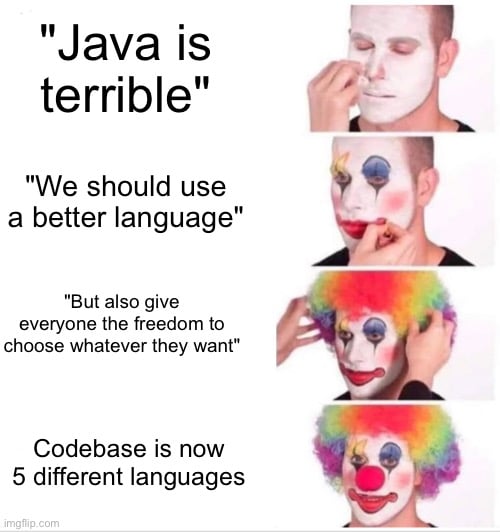this post was submitted on 05 Apr 2024
519 points (94.4% liked)
Programmer Humor
19572 readers
1673 users here now
Welcome to Programmer Humor!
This is a place where you can post jokes, memes, humor, etc. related to programming!
For sharing awful code theres also Programming Horror.
Rules
- Keep content in english
- No advertisements
- Posts must be related to programming or programmer topics
founded 1 year ago
MODERATORS
you are viewing a single comment's thread
view the rest of the comments
view the rest of the comments

You're not wrong, it's still a staple today, but it lost a lot of its shine a while ago. They are mimicking "new" features introduced in other languages, but make a point to preserve retrocompatibility.
I can't imagine how convoluted the JVM has become in the last 10 years.
I don't really see how that is bad..? Java wants to be widely applicable and taking the best features from other languages helps that goal, right?
C++ fanboys will talk a bunch of shit about Java for this, but c++ has been doing this same shit (and more poorly) pretty much since its inception.
And most of the newer Java stuff is syntactic sugar, so I’m not sure why that commenter is calling out JVM implementations. I’m guessing they don’t know much about the JVM, since you can compile these higher level syntax tricks down into bytecode just like you might compile more verbose source code.
Static analysis of compiled code with javap might be more difficult, but I’m betting the commenter doesn’t know what that is either.
I think the last new instruction the JVM added was invokedynamic like 10 years ago. I believe they did it so lambdas could be called efficiently. Polymorphic incline cache and stuff.
But the JVM has grown more complex in other ways. The way to force simd instructions is pretty wild, for example.
I don't know enough to call it a mess or not. It works though.